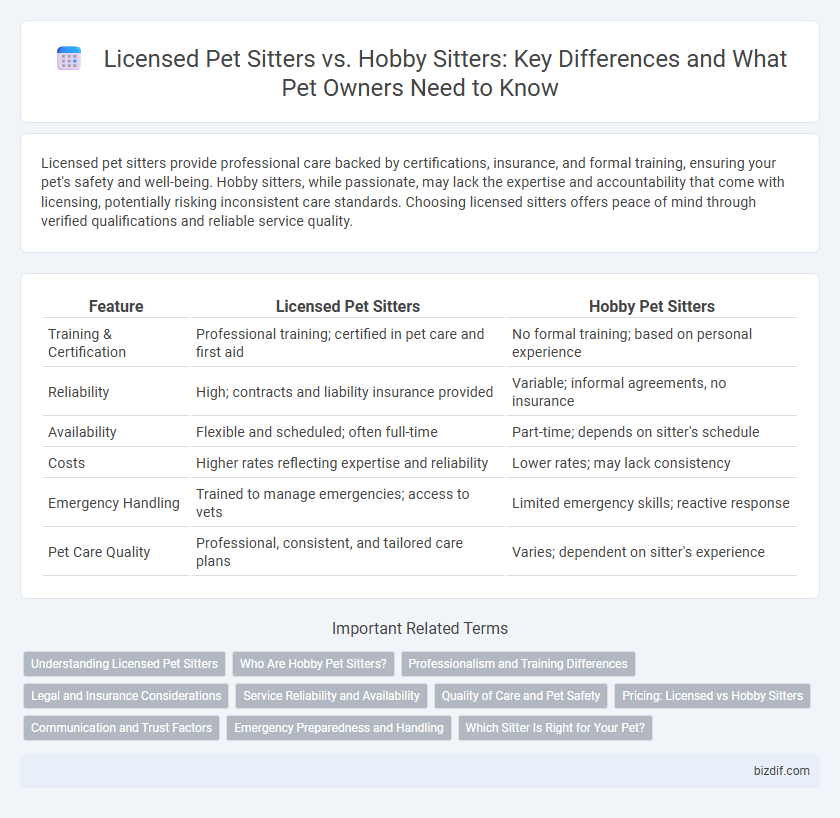Licensed pet sitters provide professional care backed by certifications, insurance, and formal training, ensuring your pet's safety and well-being. Hobby sitters, while passionate, may lack the expertise and accountability that come with licensing, potentially risking inconsistent care standards. Choosing licensed sitters offers peace of mind through verified qualifications and reliable service quality.
Table of Comparison
| Feature | Licensed Pet Sitters | Hobby Pet Sitters |
|---|---|---|
| Training & Certification | Professional training; certified in pet care and first aid | No formal training; based on personal experience |
| Reliability | High; contracts and liability insurance provided | Variable; informal agreements, no insurance |
| Availability | Flexible and scheduled; often full-time | Part-time; depends on sitter's schedule |
| Costs | Higher rates reflecting expertise and reliability | Lower rates; may lack consistency |
| Emergency Handling | Trained to manage emergencies; access to vets | Limited emergency skills; reactive response |
| Pet Care Quality | Professional, consistent, and tailored care plans | Varies; dependent on sitter's experience |
Understanding Licensed Pet Sitters
Licensed pet sitters have undergone formal training and certification processes, ensuring they meet industry standards for animal care and safety. These professionals are often bonded and insured, providing pet owners with added protection and peace of mind. Choosing a licensed sitter guarantees access to specialized knowledge in pet health, behavior, and emergency response compared to hobby sitters.
Who Are Hobby Pet Sitters?
Hobby pet sitters are individuals who offer pet care services without professional licensing or formal training, typically driven by a passion for animals rather than as a primary source of income. They often provide basic care such as feeding, walking, and companionship, but may lack the expertise to handle medical emergencies or specialized pet needs. While hobby sitters can be a budget-friendly option, pet owners should carefully evaluate their experience and reliability to ensure their pets receive proper care.
Professionalism and Training Differences
Licensed pet sitters undergo formal training and certification processes, ensuring they possess comprehensive knowledge of animal care, emergency protocols, and pet behavior. Hobby sitters typically lack professional credentials and rely on personal experience, which may result in inconsistent service quality and limited understanding of advanced pet care techniques. The professionalism demonstrated by licensed sitters guarantees reliable, safe, and well-informed care tailored to each pet's specific needs.
Legal and Insurance Considerations
Licensed pet sitters comply with local regulations and maintain liability insurance to protect clients and their pets, ensuring legal accountability and professional standards. Hobby sitters often lack formal licensing and insurance coverage, increasing the risk of legal disputes or financial liability in case of accidents or damages. Choosing a licensed sitter guarantees adherence to legal requirements and provides clients with insurance-backed security during pet care.
Service Reliability and Availability
Licensed pet sitters provide consistent, reliable services backed by formal training, certifications, and insurance, ensuring professional care and accountability. Hobby sitters may offer flexible availability but often lack standardized protocols, which can affect service reliability and emergency responsiveness. Choosing licensed sitters enhances pet safety through verified experience and guaranteed availability during scheduled times.
Quality of Care and Pet Safety
Licensed pet sitters undergo rigorous training and certification, ensuring a high standard of care and adherence to safety protocols that significantly reduce risks to pets. Hobby sitters, while often passionate, may lack formal knowledge in emergency handling, health monitoring, and behavior management, potentially compromising pet safety. Choosing a licensed sitter guarantees professional accountability, thorough pet welfare practices, and compliance with industry regulations.
Pricing: Licensed vs Hobby Sitters
Licensed pet sitters often charge higher rates due to their professional certifications, insurance coverage, and extensive training, ensuring reliable and accountable care. Hobby sitters typically offer lower prices as they provide pet sitting services more casually without formal credentials or business overhead. Pet owners should weigh cost against the assurance of quality and responsibility when choosing between licensed and hobby sitters.
Communication and Trust Factors
Licensed pet sitters demonstrate professional communication skills and maintain transparent, reliable interactions, fostering higher trust levels with pet owners compared to hobby sitters. They follow standardized protocols for updates, emergency handling, and care instructions, which enhances trust and accountability. Hobby sitters often lack formal training and structured communication, potentially leading to inconsistent information and reduced confidence from clients.
Emergency Preparedness and Handling
Licensed pet sitters undergo specialized training in emergency preparedness and handling, ensuring they can respond effectively to medical crises and unexpected situations. Hobby sitters often lack formal training, which may limit their ability to manage emergencies promptly and efficiently. Choosing licensed sitters enhances the pet's safety through verified skills and access to professional resources during emergencies.
Which Sitter Is Right for Your Pet?
Licensed pet sitters offer professional care backed by certifications, insurance, and adherence to safety standards, ensuring peace of mind for pet owners. Hobby sitters might provide a more affordable, casual service but often lack formal training and liability coverage. Choosing the right sitter depends on your pet's specific needs, health requirements, and the level of experience and reliability you prioritize.
Licensed sitters vs Hobby sitters Infographic

 bizdif.com
bizdif.com